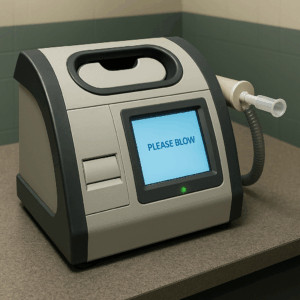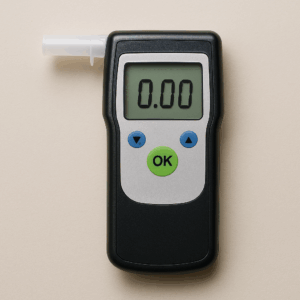Can You Get Out of a Breathalyzer in Pierce County, Washington?
If you are stopped in Tacoma or elsewhere in Pierce County on suspicion of driving under the influence (DUI), one of the first questions you may face is: Do I have to take a breathalyzer test? Many drivers wonder whether refusing the test will help them avoid a DUI conviction.
The truth is more complicated. Washington law makes a key distinction between roadside portable breath tests and post-arrest breath tests. One is voluntary and inadmissible in court, while the other is governed by strict implied consent rules. Below, our Tacoma DUI defense attorneys explain what you need to know about breathalyzer tests in Pierce County, including the risks, the consequences, and what choices may mean for your future.
For help with your case from our Tacoma, WA DUI defense attorneys, call the Law Offices of Smith & White at (253) 203-1645.
Roadside Portable Breath Tests in Washington
During a DUI stop, officers often offer a handheld portable breath test (PBT). This test is used only to help officers decide whether to arrest you.
Key facts about PBTs in Washington:
- They are voluntary. You do not have to take one.
- Refusing a PBT does not trigger license suspension.
- PBT results are inadmissible in court to prove guilt, because the devices are not considered reliable enough for trial. Officers may only use them to establish probable cause.
Should You Take the Roadside Breath Test?
Drivers often ask whether it makes sense to blow into the roadside device. The answer depends on the circumstances.
Reasons to decline the PBT:
- The results cannot be used in court to prove guilt but can make it easier for officers to justify arrest.
- If you believe you are close to or above the legal limit, refusing avoids giving officers more evidence at the roadside.
- Declining carries no penalty—your license is not affected.
Reasons to comply with the PBT:
- If you are confident you are sober or well under the limit, a low reading might persuade the officer not to arrest you.
- In some cases, a favorable PBT result may help your defense later. While not admissible as evidence of guilt, it can sometimes be used strategically to challenge probable cause or provide leverage in plea negotiations.
- Some drivers choose to cooperate to avoid escalating the encounter.
The key point is that the PBT is not required and cannot be used directly against you in court. But in limited circumstances, it can still influence both the officer’s decision in the moment and the course of your defense later.
Post-Arrest Breath Tests and Implied Consent
Once you are formally placed under arrest for DUI in Tacoma, Lakewood, Puyallup, or anywhere else in Pierce County, the rules change. Officers may request a breath test on a calibrated machine, such as the Draeger Alcotest, at the police station or a DUI processing unit.
At this stage, Washington’s implied consent law (RCW 46.20.308) applies. By driving in Washington, you have already given implied consent to this test after a lawful DUI arrest.
What Officers Must Tell You
Before the post-arrest test, officers must read the implied consent warnings. These include:
- Refusing will result in a minimum one-year license revocation.
- Your refusal can be used as evidence against you in your DUI case.
- If you take the test and your blood alcohol concentration (BAC) is 0.08 or higher, your license will be suspended even without a conviction.
Consequences of Refusing a Post-Arrest Breath Test
Refusing the official breath test after arrest carries automatic penalties under Washington law. These include:
- License revocation: One year for a first refusal. Two years or longer if you have prior DUI-related incidents in the past seven years.
- Department of Licensing (DOL) hearing: You have only seven days to request a hearing to contest the suspension. If you miss the deadline, the suspension is automatic.
- Criminal case impact: Refusal may be introduced in court as evidence of guilt. Prosecutors can still move forward using officer observations, field sobriety tests, or dashcam footage.
- Insurance and financial impact: Refusal often increases insurance rates and can result in higher fines or longer ignition interlock requirements if convicted.
Refusing vs. Failing: Which Is Worse?
Many people assume refusing the test helps them avoid conviction. In reality, refusing often leads to harsher consequences than taking the test and failing. For DOL purposes:
- A first DUI with a BAC under 0.15% leads to a 90-day license suspension.
- A first refusal leads to a one-year license revocation.
In addition, refusal denies your attorney the chance to challenge BAC results in court, which can sometimes be a useful defense. And refusal has harsher minimum sentence requirements that a first DUI with a BAC under .15%.
When Refusal Can Be Challenged
While refusal penalties are strict, an experienced Pierce County DUI lawyer may be able to contest them in some cases. Defenses may include:
- The officer failed to properly read the implied consent warnings.
- The arrest was unlawful because the officer lacked reasonable grounds for DUI.
- The alleged refusal was not clear (for example, a malfunctioning machine or medical inability to blow).
- Documented medical conditions (such as asthma or lung disease) prevented you from providing a valid sample.
Example of a DUI Refusal in Pierce County
Consider this fictional but realistic scenario:
David is stopped in Lakewood after rolling through a stop sign late at night. The officer offers him a roadside portable breath test. David declines, which is his right and carries no penalty.
Based on his driving and other signs, the officer arrests him for DUI. At the station, he is asked to take the official breath test. He refuses.
- The Department of Licensing moves to revoke his license for one year.
- David requests a DOL hearing within the seven-day window.
- His attorney argues the officer misread the implied consent warning.
If successful, David may avoid the license revocation. However, prosecutors may still rely on officer testimony and field sobriety test results to pursue a DUI conviction.
Frequently Asked Questions About Breathalyzers in Pierce County
Is refusing the roadside PBT the same as refusing the post-arrest test?
No. The roadside test is voluntary and inadmissible in court. The post-arrest test is mandatory under implied consent law, and refusal carries harsh penalties.
Can officers force me to take a breath test?
Officers cannot physically force you to blow into a breathalyzer. However, in some cases they may obtain a warrant for a blood test instead.
If I refuse, can I still be convicted of DUI?
Yes. Prosecutors can use officer observations, field sobriety test results, or blood test evidence to convict you even without a breath test.
Why do some people take the roadside PBT if it’s inadmissible?
Some drivers hope a low result will persuade officers not to arrest them. In certain cases, a favorable result can later be used strategically by the defense to challenge probable cause or as leverage in plea bargaining, even though it is not admissible at trial. Others decline, knowing it cannot directly help them in court but may hurt them in establishing probable cause.
What to Do If Asked to Take a Breathalyzer in Tacoma or Pierce County
- Remember: roadside PBTs are voluntary and inadmissible in court. Our attorneys recommend that you take it because generally an Officer offering the test has already decided to arrest you for DUI if you refuse.
- If arrested, the post-arrest breath test carries implied consent penalties if refused. Consult with the on-call attorney before making a decision.
- Listen carefully to the officer’s implied consent warnings.
- Document any medical issues that affect your ability to take the test.
- Contact a Tacoma DUI defense lawyer immediately to protect your license and your case.
Bottom Line: Can You Get Out of a Breathalyzer in Pierce County?
You can refuse a breathalyzer test in Pierce County, but refusal often makes things worse. Roadside portable breath tests are voluntary and inadmissible in court, but once you are arrested, Washington’s implied consent law takes over. Refusing the post-arrest test results in automatic license revocation and may be used against you in court.
The smartest step after a DUI stop in Tacoma or Pierce County is to seek immediate legal representation. A skilled defense attorney can help you challenge your license suspension, contest the criminal charges, and protect your future.
For help with your case from our University Place, WA DUI defense attorneys, call the Law Offices of Smith & White at (253) 203-1645. We can guide you through both the Department of Licensing hearing and the criminal court process.


